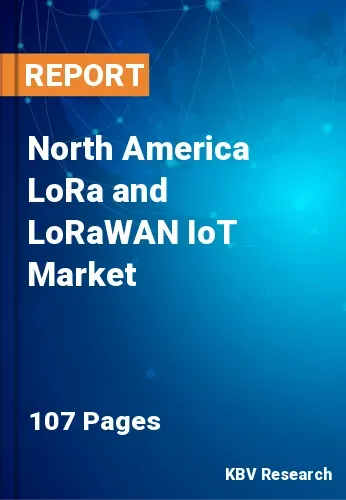The North America LoRa and LoRaWAN IoT Market would witness market growth of 35.1% CAGR during the forecast period (2023-2030).
LoRa and LoRaWAN are low-power wide-area network (LPWAN) wireless communication network protocols and actors that operate in the unlicensed spectrum. Rising government expenditures and initiatives to establish LoRa and LoRaWAN IoT developments are the primary factor propelling the market's expansion. Governments have initiated smart city initiatives to improve urban infrastructure and services. LoRa and LoRaWAN technologies offer a cost-effective and scalable solution for various smart city applications, including waste management, smart lighting, parking, and environmental monitoring, fueling the market growth.
Long-range wireless communication is made possible by LoRa, which enables electronic devices to send data over distances of up to 10 kilometers in rural areas and several kilometers in urban areas. Applications that require vast coverage including smart cities, agricultural monitoring, and industrial monitoring are the ones that stand to benefit the most from this extended range. IoT devices can have longer battery lives since LoRa devices are built to consume less power than other similar technologies. To accomplish this low level of power consumption, business use modulation techniques that have been thoroughly optimized, as well as efficient utilization of the radio spectrum. It makes it possible to install Internet of Things systems in areas that are hard to reach or inaccessible and with power sources that are either limited or prohibitive.
The region has witnessed an increase in government incentives for using innovative agricultural technologies and infrastructure improvement. The National Institute of Food and Agriculture (NIFA), a branch of the "United States Department of Agriculture," implements geospatial, sensor, and precision technology projects to educate farmers. Additionally, NIFA collaborates with Land-Grand institutions to assist farmers in developing robust sensors, software, and tools for modeling, monitoring, and evaluating a vast array of complex biological materials and processes. Thus, the increasing use of high-tech technology and the growing popularity and support of the LoRa and LoRaWAN IoT in the agriculture sector to improve agricultural outcomes while taking fewer resources will contribute to the growth of the regional market.
The US market dominated the North America LoRa and LoRaWAN IoT Market by Country in 2022, and would continue to be a dominant market till 2030; thereby, achieving a market value of $11,935 million by 2030. The Canada market is anticipated to grow at a CAGR of 38.2% during (2023 - 2030). Additionally, The Mexico market would witness a CAGR of 37% during (2023 - 2030).
Based on End User, the market is segmented into Manufacturing, Retail, Transportation & Logistics, Energy & Utilities, Government & Public, Safety, Enterprise, Healthcare, Agriculture, Residential, Travel & Hospitality and Others. Based on Component, the market is segmented into Hardware, Platform and Services. Based on Application, the market is segmented into Industrial IoT, Smart Agriculture & Livestock Management, Smart Buildings, Smart Cities, Smart Healthcare, Asset Tracking and Others. Based on countries, the market is segmented into U.S., Mexico, Canada, and Rest of North America.
Free Valuable Insights: The Worldwide LoRa and LoRaWAN IoT Market is Projected to reach USD 48.4 Billion by 2030, at a CAGR of 36.8%
The market research report covers the analysis of key stake holders of the market. Key companies profiled in the report include Advantech Co., Ltd., NEC Corporation, Tata communications limited (Tata Group), Nwave Technologies, Inc., Semtech Corporation, Orange S.A., Bosch Sensortec GmbH (Robert Bosch GmbH), Amazon Web Services, Inc. (Amazon.com, Inc.), Datacake GmbH, and RAKwireless Technology Limited.
By End User
By Component
By Application
By Country

Our team of dedicated experts can provide you with attractive expansion opportunities for your business.

